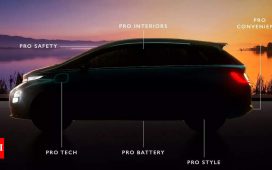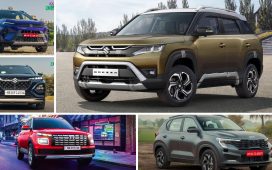![Export-ready cars are seen parked at a exclusive port for automobiles in Pyeongtaek, Gyeonggi, on April 24. [NEWS1]](https://www.wiredfocus.com/wp-content/uploads/2025/05/Korean-companies-search-for-solutions-as-Trump039s-25-auto-parts.jpg)
Export-ready cars are seen parked at a exclusive port for automobiles in Pyeongtaek, Gyeonggi, on April 24. [NEWS1]
As the 25 percent tariff imposed by U.S. President Donald Trump on foreign automobile parts officially went into effect on Saturday, Korean companies have begun scrambling to come up with solutions.
Some analysts expect the impact of these tariffs to be even greater than that of the tariffs on finished vehicle imports.
The share of Korea’s auto parts exports to the United States rose from 29.5 percent in 2020 to 36.5 percent last year, according to the Korea International Trade Association (KITA) on Sunday.
Among the auto parts imported by the United States, Korean-made components accounted for 6.4 percent as of last year, amounting to $13.5 billion. The auto industry estimates that around 60 to 70 percent of these parts were supplied to Korean automakers, such as Hyundai Motor and Kia.
To reduce the shock of the tariffs, companies in the finished vehicle parts and tire industries are exploring strategies such as adjusting production volumes and diversifying supply chains.
Suppliers with U.S.-based manufacturing, including Hyundai Mobis, Hankook Tire and Kumho Tire, are planning to increase shipments to the U.S. market and expand production at their local plants.
![Cars are waiting to be exported at a port in Pyeongtaek,on April 29. [NEWS1]](https://www.wiredfocus.com/wp-content/uploads/2025/05/1746413850_959_Korean-companies-search-for-solutions-as-Trump039s-25-auto-parts.jpg)
Cars are waiting to be exported at a port in Pyeongtaek,on April 29. [NEWS1]
“The imposition of tariffs on auto parts could hurt profitability,” said Lee Ho-geun, professor of automotive engineering at Daeduk University. “In the long term, companies need to expand local production to minimize the effects of tariffs or develop alternative markets by changing supply chains.”
Some analysts suggest that the new parts tariff could have a more detrimental effect on the U.S. auto industry than the existing tariffs on imported cars, according to reports by U.S. media outlets
“A new round of auto tariffs — this time on parts — coming into effect Saturday could upend the industry, even more than previous levies on imported cars,” CNN said in a report on Saturday.
CNN estimated that even with the Trump administration’s decision to partially refund the tax paid for the parts tariffs for vehicles assembled in the United States, the added cost per vehicle would still average about $4,000.
Translated from the JoongAng Ilbo using generative AI and edited by Korea JoongAng Daily staff.
BY PARK YOUNG-WOO [[email protected]]








